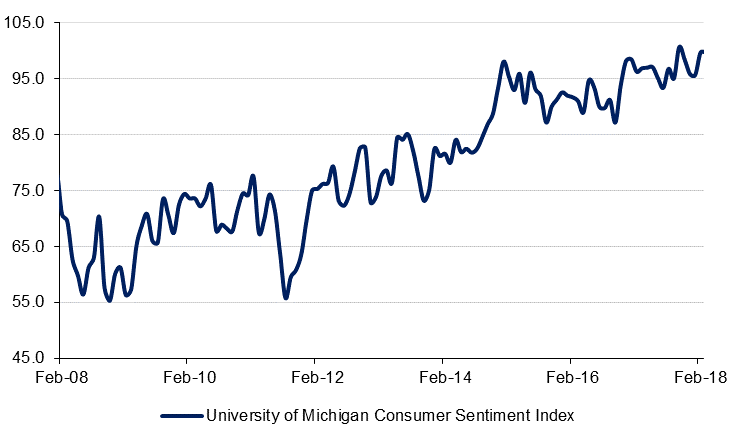
US President Donald Trump announced on Friday that he is planning to impose import tariffs of 25% on steel and 10% on aluminium this week, raising fears of a global trade war. Voices from major trade partners including Canada and the EU – the two largest exporters of steel to the US – have already raised the prospect of retaliatory tariffs on US products if these go ahead.
Final results from Italy’s election are yet to be announced, but a hung parliament looks likely, as was widely expected, with no party set to win an outright majority. Early polls suggest that two populist parties, the Five Star Movement, and The League, will emerge the two largest. The centre-right coalition between The League, Silvio Berlusconi’s Forza Italia and Brothers of Italy will most likely secure the most votes overall, narrowly followed by Five Star. The League’s strong showing could mean that its leader Matteo Salvini can negotiate the premiership from the coalition, raising fears over increased EU scepticism. While unlikely, a partnership between The League and Five Star would be the most disruptive outcome for markets owing to concerns over populist policies. However, some of the more virulent Euroscepticism in Italian politics has waned over the past year, and aims to leave the bloc and the Euro have muted.
Elsewhere in Europe, Germany’s Social Democrats (SPD) voted to join a grand coalition with the Christian Democrats, ending months of wrangling and uncertainty in Europe’s largest economy. 66% of SPD members voted in support of joining the coalition, a stronger-than-hoped-for outcome. Angela Merkel is expected to be re-inaugurated by mid-March.
Saudi Arabia has announced it is increasing its existing syndicated loan, issued in 2016, by USD 6bn. The new USD 16bn loan will reportedly be priced 30% lower than the original 2016 loan, and the debt office has indicated the transaction will be completed by the middle of this month. Elsewhere in the region, Egypt’s foreign reserves have surged to a record USD 42.5bn in the wake of February’s USD 4bn Eurobond issuance. The sizeable cushion will give the central bank some space to continue its monetary easing.

US Treasuries ended last week largely unchanged as hawkish comments from the Fed Chairman was offset by announcement of import tariffs on steel and aluminium by the US President. Yields on the 2y UST, 5y UST and 10y UST ended the week at 2.24% (flat 5d), 2.62% (+1 bps 5d) and 2.86% (flat 5d) respectively.
European government bonds closed largely unchanged heading into the Italian result. This indicates that a bad result in not priced in at the moment which in turn could lead to some volatility at the start of the week should results come on unexpected lines.
Regional bonds continued to drift lower. The YTW on the Bloomberg Barclays GCC Credit and High Yield index rose +4bps 5d to 4.18% and credit spreads widened 5 bps to 159 bps.
Saudi Arabia raised the size of its USD 10bn syndicated loan by USD 6bn following an ‘exceptional’ response from banks. The margin on the new loan has been reduced to 75bps over Libor from 103bps offered in 2016.
Fitch cut Bahrain’s ratings to BB- from BB+. The rating agency attributed the downgrade to lack of government plan to trim deficit.
USD had a softer finish towards the end of last week, almost wiping out all of the week’s earlier gains on Thursday and Friday after comments from President Trump touting the virtues of a trade war. Following these end of week declines, the dollar index finished the week 0.12% higher at 89.99, despite having traded as high as 90.93 on 1 March 2018. At the current price, the index is back below the 50 day moving average of 90.55, which will serve as a level of resistance.
JPY has been the main beneficiary due to safe haven bids, USDJPY falling 1.70% from last week’s high of 107.68, to close the week at 105.75. Having failed to break above the 23.6% one year Fibonacci retracement (107.67) and reached a new one year low of 105.25, the short term outlook is bearish for USDJPY and a further reset of 105 seems likely in the near term.
It was a sluggish start to the week for regional equities with the DFM index adding +0.1% and the Tadawul losing -0.6%. In a trend similar to last week, volumes continued to remain well below par.
In terms of stock, Al Tayyar Travel added +4.2%. This follows speculation about the reason for a huge cross trade in the stock worth USD 120mn at the end of last week.
Oil prices edged up higher on Friday to trim its weekly loss. The WTI and Brent price ended the week with losses of -3.6% 5d and -4.4% 5d to close at USD 61.25/bbl and USD 64.37/bbl respectively. The decline last week took Brent prices (-3.7% ytd) into negative territory for the year while WTI prices (+1.4% ytd) still remains in positive territory.
The data released last week by Baker Hughes showed that the US rig count has risen to 800 for the first time in almost three years.